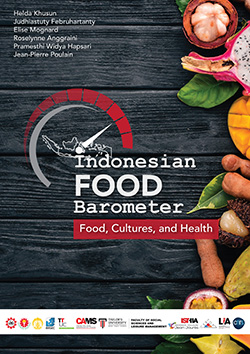Indonesian Food Barometer
Food, Cultures and Health
 Helda Khusun, Judhiastuty Februhartanty, Elise Mognard, Roselynne Anggraini, Pramesthi Widya Hapsari, Jean-Pierre Poulain
Helda Khusun, Judhiastuty Februhartanty, Elise Mognard, Roselynne Anggraini, Pramesthi Widya Hapsari, Jean-Pierre Poulain
SEAMEO RECFON, Jakarta
2022, 225 p.
ISBN : 978-623-7759-83-6
![]() English text
English text
Read / Download the publication :
The purpose of Indonesian Food Barometer (IFB) was to provide evidence on the relationship of social, cultural, and nutritional determinants of nutrition transition for making contextually relevant recommendations of nutritional and health status of the population.
More specifically, the study aimed to :
- Describe the sociodemographic characteristics of the sample of Indonesian respondents,
- Describe the food habits, norms, practices in terms of contents (food and nutrition), spatiality (eating out or in the home), temporality, sociality, socio-cultural representations, and beliefs,
- Assess the relationship of food habits, (food and nutrition), spatiality (eating out or in the home), temporality, sociality, socio-cultural representations, and beliefs, with the sociodemographic characteristics,
- Assess the macronutrient intakes and the sources of protein as indicators of nutrition transition, and
- Analyze the links between the nutritional status as a health outcome with the socio- cultural demographic characteristics.
—
TABLE OF CONTENTS
FOREWORD
REMARKS ACKNOWLEDGMENTS
TABLE OF CONTENTS
LIST OF FIGURES
LIST OF TABLES
INTRODUCTION
- Background
- Study Objectives
- Research Field Organization
RESEARCH METHODS
- Design
- Qualitative Approach
- Quantitative Approach
- Data Analysis
- Pilot Study and Training of Enumerators
- Ethics Review and Informed Consent
QUANTITATIVE FINDINGS
- Sociodemographic Characteristics
- Food Days
- Mealtime
- Norms and practices for the food intakes
- Meal organization
- Socialization of food intakes
- Cooking Practices
- Socio-Cultural Representations of Food
- Meaning of food
- Eating well
- Risk representations towards food
- Representation on food beneficial for health
- Representation on food to be reduced for good health
- Indonesian Emblematic Dishes
- Macronutrient Intakes
- Nutritional Status
QUALITATIVE FINDINGS
- Characteristics of the Respondents
- Dimensions of the Word “Meal”
- Proper meal
- Importance of food components in a complete meal
- Protein Source Foods
- Lauk
- Fritters as lauk substitute
- The importance of milk in a daily meal
- Eating-in and Eating-out throughout the Day
- Mealtimes during weekdays and weekends
- Where and what to eat : who decides ?
- Eating Companion and Food Sharing
- Indonesian Cuisine as Food Identity
- Sustainable Diet
PERSPECTIVE AND WAYS FORWARD
REFERENCES
APPENDICES











